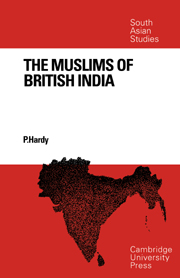Book contents
- Frontmatter
- Contents
- A note on spelling
- Acknowledgements
- 1 Introduction: the medieval legacy
- 2 The effects of British rule on Muslims before 1857
- 3 1857 and its aftermath
- 4 Muslims come to terms with British India as Muslims
- 5 Muslims move towards political community 1871–1901
- 6 Muslims acquire a constitutional identity and enter all-India politics
- 7 Religion enters politics 1910–24
- 8 The period of frustration 1924–35
- 9 The two partitions: of British India and of the Muslim community
- Maps
- A descriptive bibliography of works in European languages
- Glossary
- Index
9 - The two partitions: of British India and of the Muslim community
Published online by Cambridge University Press: 19 October 2009
- Frontmatter
- Contents
- A note on spelling
- Acknowledgements
- 1 Introduction: the medieval legacy
- 2 The effects of British rule on Muslims before 1857
- 3 1857 and its aftermath
- 4 Muslims come to terms with British India as Muslims
- 5 Muslims move towards political community 1871–1901
- 6 Muslims acquire a constitutional identity and enter all-India politics
- 7 Religion enters politics 1910–24
- 8 The period of frustration 1924–35
- 9 The two partitions: of British India and of the Muslim community
- Maps
- A descriptive bibliography of works in European languages
- Glossary
- Index
Summary
By its provisions, the Government of India Act of 1935 was certain to transform the grammar and syntax of Indian politics. At one stroke, the lowering of the franchise qualifications increased the electorate to over thirty millions. The increase in the number of general seats in the provincial legislative assemblies enabled un-trammelled expression to be given, in the Hindu majority provinces, to a Hindu majority will – untrammelled, that is, except by the reserve powers in the hands of the British provincial governor and ultimately, through the Viceroy, of the Secretary of State.
In the United Provinces, the number of seats in the Assembly was increased to 228, of which 140 were general, including 20 for scheduled castes, and 66 Muslim. In Bihar there were 86 general to 40 Muslim seats, out of a total of 152 seats. In Bombay, of 175 seats, 114 were general, including 15 for scheduled castes, and 30 were Muslim. In Madras, 146 of the total of 215 were general, with 30 of those general seats reserved for scheduled castes; there were 28 Muslim seats. In the Muslim majority provinces of the Panjab and Bengal, however, a majority will was denied full constitutional expression; in the Panjab there were 42 general seats, 86 Muslim seats, 31 Sikh seats and the remaining seats were to represent special interests. In Bengal, with its 250 seats, 78 were general, of which 20 were reserved for scheduled castes, 119 were Muslim and there were 19 for representatives of commercial, industrial, mining and planting interests.
- Type
- Chapter
- Information
- The Muslims of British India , pp. 222 - 255Publisher: Cambridge University PressPrint publication year: 1972



